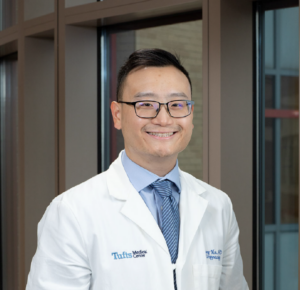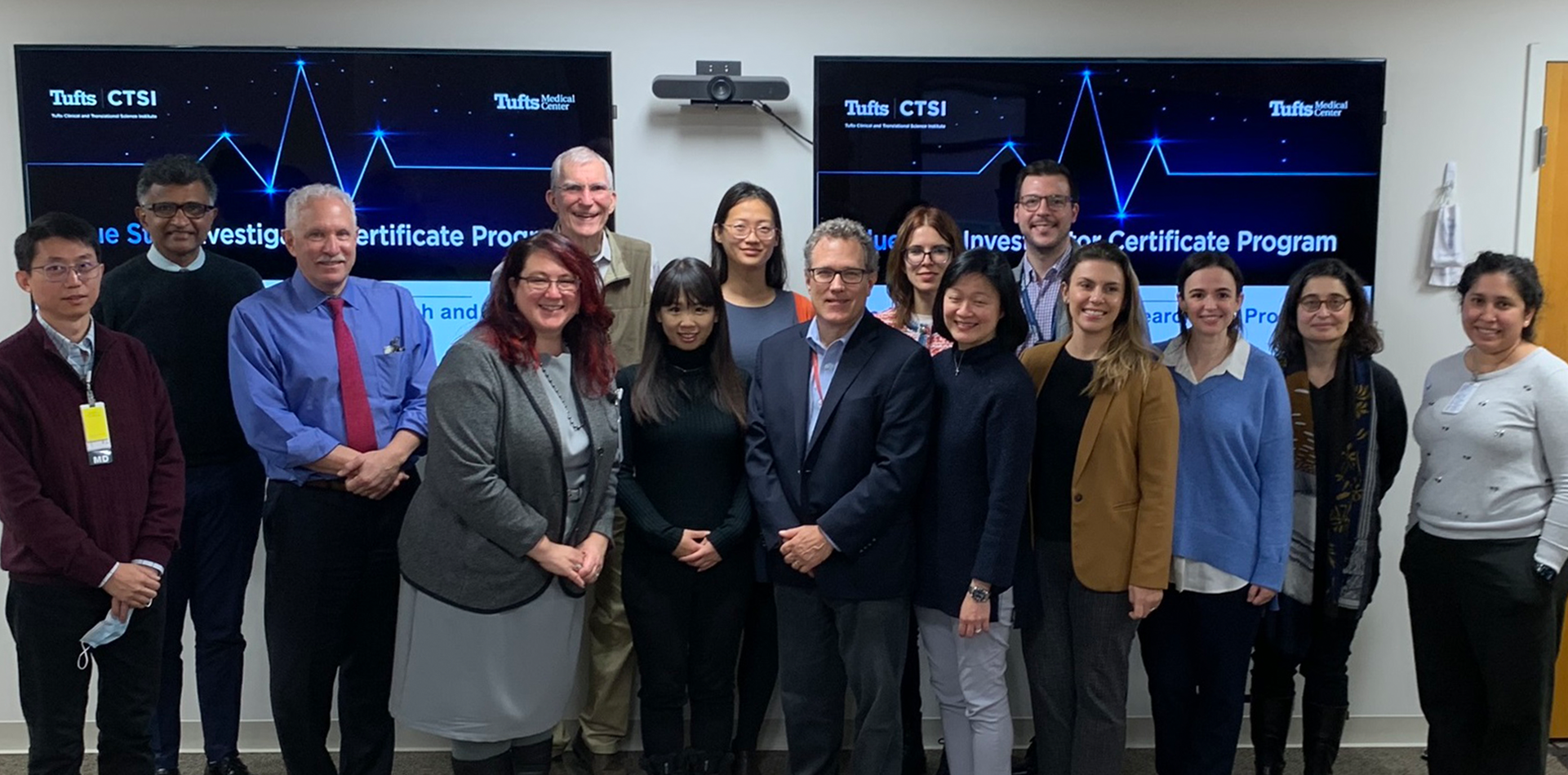BIRCWH Program Scholars
2023 Scholars
 Sharanya Mohanty, MD
Sharanya Mohanty, MD
Internal Medicine, Tufts Medical Center
Project: Sex Differences in Aortic Stenosis
Sharanya Mohanty, MD, recently completed her fellowship in Cardiovascular Medicine and is currently an attending physician at Tufts Medical Center. Dr. Mohanty earned her medical degree from Rutgers Robert Wood Johnson Medical School and completed her residency in Internal Medicine and fellowship in Cardiovascular Medicine at Tufts Medical Center. She is currently completing a MS in Clinical and Translational Science at Tufts University Graduate School of Biomedical Sciences.
Dr. Mohanty’s BIRCWH study aims to address existing disparities in the diagnosis, management, and outcomes of aortic stenosis between men and women. Aortic stenosis (AS), the most common valvular heart disorder in the developed world, has significant implications for women’s health. Despite having a greater symptom burden at the time of presentation and fewer comorbidities than men, women with AS are less likely to be referred to specialists, undergo less diagnostic workup, and are far less likely to undergo aortic valve replacement than men. This results in a more advanced disease stage at the time of referral and contributes to disproportionately higher mortality rates and worse outcomes for women with AS.
The primary objective of Dr. Mohanty’s study is to shed light on the mechanisms underpinning these disparities by examining sex-specific differences in cardiac damage (CD) stage and its impact on disease progression over time and treatment in those with progressive AS. The insights gained from this study have the potential to shape future guidelines for classifying disease severity and determining the optimal timing of valvular intervention in women with AS. By understanding and addressing these sex-based differences, we aim to foster more individualized, patient-centered, and equitable care for women with aortic stenosis, thereby enhancing women’s cardiovascular health overall.
 Tsung Mou, MD
Tsung Mou, MD
Urogynecology & Pelvic Reconstructive Surgery Attending, Tufts Medical Center
Assistant Professor, Tufts University School of Medicine
Project: The Development of a Reliable and Patient-reported Measure to Predict Lower Urinary Tract Treatment Patterns among Asian American Women
Tsung Mou, MD is an Attending Urogynecologist and an Assistant Professor in the Department of Obstetrics & Gynecology at Tufts Medical Center. He completed his fellowship in Female Pelvic Medicine & Reconstructive Surgery at Northwestern University in 2022 after completing his Obstetrics & Gynecology residency at New York Presbyterian – Weill Cornell Medical Center.
Lower urinary tract symptoms (LUTS) are 4-5 times more common in women than in men. Of those with LUTS, Asian American women had the lowest care utilization and surgical treatment rates. Dr. Mou’s BIRCWH study aims to understand the multilevel factors that default Asian American women to less effective management strategies for their lower urinary tract symptoms. To achieve this goal, he will leverage advanced qualitative methods and cross-cultural psychometrics to develop a minority-centered and patient-reported measurement tool. This tool will be developed to capture and understand how multilevel determinants contribute to lower urinary tract treatment inequity. The results from this study will lead to new hypotheses and better methods to measure health inequity for Asian American subgroups most affected by pelvic health disparity.
2022 Scholars
Larissa Calancie, PhD
Research Assistant Professor, Tufts University Friedman School of Nutrition Science and Policy
Project: Promoting Healthy Weights Among Mothers and Babies: Developing a Simulation Model to Identify Effective Interventions that Address Health Disparities
Larissa Calancie, PhD is a Research Assistant Professor in the Friedman School of Nutrition Science and Policy. Dr. Calancie earned her doctorate in Nutrition at the University of North Carolina at Chapel Hill’s Gillings School of Global Public Health, and then completed post-doctoral training at the Center for Health Equity Training and the Maternal and Child Health Workforce Development Center at UNC.
Dr. Calancie’s BIRCWH study aims to answer the following research question: What interventions are effective at disrupting a cycle of maternal obesity, placental metabolic dysfunction, and excess infant fat mass? We will use data collected from a diverse group of women to build a system dynamics model of the mechanisms linking maternal and placental lipid metabolism and infant body composition. Next, we will use the model to estimate the effects of lifestyle interventions that could disrupt the early biological foundations of intergenerational obesity, with special attention to interventions that address health disparities. The data and results generated from this study will set the stage for larger-scale, equity-focused intervention and modeling studies that extend into early childhood and beyond.
Amy LeClair, PhD, MPhil
Assistant Professor, Department of Medicine, Tufts Medical Center
Assistant Professor, Tufts University Graduate School of Biomedical Sciences
Assistant Professor, Tufts CTSI
Project: Development and Implementation of Strategies to Increase Documentation of Sexual Orientation and Gender Identity (SOGI): A Pilot Study
Amy LeClair, PhD, MPhil, is a medical sociologist and Assistant Professor in the Department of Medicine at Tufts Medical Center (Tufts MC) and Tufts University Graduate School of Biomedical Sciences, with a joint appointment at Tufts Clinical and Translation Sciences Institute (CTSI). Dr. LeClair earned her PhD from New York University and then completed a T32 post-doc at Rutgers University’s Institute for Health, Health Care Policy, and Aging Research prior to joining Tufts in 2015.
For years, numerous national professional societies and government agencies have called on health networks and medical practices to routinely collect data on patients’ sexual orientation and gender identity (SOGI). Widespread adoption of these guidelines, however, continues to lag. Collecting SOGI data, just as regular collection of other demographic data like race and ethnicity, religion, and educational status, can help providers deliver patient-centered, guideline concordant care. Prior research shows high levels of acceptability among patients of all sexual orientations and gender identities. Dr. LeClair’s research has three goals: (1) Identify the potential challenges to collecting SOGI data in Tufts MC’s primary care practice by speaking to a broad array of staff and clinicians; (2) Engage a panel of stakeholder to develop and tailor strategies to address those challenges; (3) Implement those strategies in Tufts MC Primary Care and begin the routine collection and documentation of patients’ SOGI data as part of their other demographic information in the electronic health record (EHR).
Sebastian Z. Ramos, MD
Maternal Fetal Medicine Physician, Tufts Medical Center
Assistant Professor of Maternal Fetal Medicine, Tufts University School of Medicine
Project: Contribution of Systemic Racism to Disparities in Obstetric and Neonatal Outcomes
Sebastian Z. Ramos, MD is an Assistant Professor of Maternal Fetal Medicine in the Division of Obstetrics and Gynecology at Tufts Medical Center. He attended medical school at the University of Massachusetts Medical School and completed his Obstetrics and Gynecology residency and Maternal Fetal Medicine fellowship at the Warren Alpert Medical School of Brown University/Women and Infants Hospital. Dr. Ramos joined Tufts Medical Center in 2022 as a Maternal Fetal Medicine physician and an Assistant Professor of Maternal Fetal Medicine as well as an Associate Principal Investigator in the Mother Infant Research Institute.
In the US, minority race, ethnicity and low socioeconomic status are independent risk factors for maternal morbidity and mortality. Epidemiological studies have also demonstrated that adverse exposures during gestation have intergeneration effects suggesting that maternal morbidity and mortality risk perpetuates health consequences for future generations. What is unknown is how structural racism, at the systemic and individual level as measured by the Systemic Racism Index contributes to already established risk factors and whether intervening to reduce this type of systematic stress might reduce inequities in outcomes. Dr. Ramos’ project intends to fill this gap in the literature. His research has three goals: (1) Compare rates of obstetric complications known to have significant racial/ethnic/socioeconomic inequity in areas with the highest versus lowest quartile of the Systemic Racism Index; (2) Perform qualitative interviews to assess how structural racism may lead to differences in care for similar patients and understand these barriers at the individual patient level.
Previous Scholars and Testimonials:
Elena Byhoff, MD, MSc
Assistant Professor, Tufts Medical Center Institute for Clinical Research and Health Policy Studies
Project: Understanding and Addressing Social Determinants of Health for Women in Primary Care: A Mixed Methods Approach
Laura Corlin, PhD
Assistant Professor of Public Health and Community Medicine, Tufts University School of Medicine
Project: Novel Framework to Make Causal Inferences about Complex Environmental Exposures
Jennifer Dupont, PhD
Assistant Professor, Tufts School of Medicine, Molecular Cardiology Research Institute
Project: Sexual dimorphic role of Angiotensin II type 2 receptor in vascular aging
Sasha Fleary, PhD
Evans Family Assistant Professor in Cognition and Learning, Eliot-Pearson Department of Child Study and Human Development
Project: Determining the sex differences in the relationship between health literacy, health knowledge, and health behaviors in adolescents
Whitney Perry, MD, MS
Attending Physician, Tufts Medical Center
Project: Sex-based differences in immune response in solid organ transplant recipients
Elizabeth Yen, MD, MA
Neonatologist, Tufts Medical Center; Chair, Women in Medicine and Science (WiMS); Principal Investigator, Mother Infant Research Institute; Assistant Professor, Tufts University School of Medicine
Project: Non-invasive evaluation of the sex-dependent impact of prenatal opioid exposure on the brain reward center regulating newborn feeding



